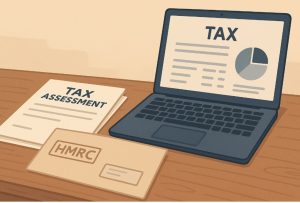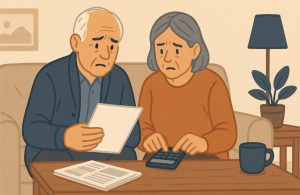Table of Contents
ToggleWhy Are More Pensioners Than Ever Receiving Unexpected Tax Bills from HMRC?
In the 2023/24 tax year, HMRC issued an unprecedented 1.32 million simple assessments, a sharp increase of 74% compared to the previous year’s 757,745. This surge marks the highest number on record and more than doubles the average annual figures reported over the previous six years.
This data, obtained through Freedom of Information requests, highlights a worrying trend: pensioners across the UK are increasingly finding themselves caught in HMRC’s tax net, often without prior warning or clear understanding of why they now owe money.
A core driver behind this surge is the freeze on income tax thresholds, introduced by the UK government in 2021 and extended until 2028.
At the same time, the state pension triple lock which increases pension payments in line with inflation, wage growth, or 2.5%, whichever is highest, has boosted pensioner incomes year-on-year.
Together, these policies have led to a phenomenon known as fiscal drag, pulling more pensioners into taxable income brackets even though their spending power hasn’t significantly improved.
This shift has sparked anxiety among retirees who believed their modest incomes would remain untaxed. Many have suddenly received HMRC demands for hundreds or even thousands of pounds in backdated tax, leaving them distressed and confused.
What Is a Simple Assessment, and How Does It Work?

A simple assessment is HMRC’s way of collecting tax without requiring the individual to complete a full self-assessment tax return.
This method is typically applied when HMRC already holds sufficient information to determine how much tax is owed. It’s most commonly used for individuals with uncomplicated financial circumstances, such as retirees with a mix of state and private pensions.
For many pensioners, this might sound like a convenience. However, the reality is far more troubling. These assessments often arrive without warning, lack sufficient explanation, and are difficult to dispute due to limited support channels.
For someone who believed they were earning below the personal allowance threshold of £12,570, receiving such a letter can be deeply unsettling.
This system disproportionately affects pensioners because:
- State pensions are paid gross, meaning without tax deductions at source.
- Many retirees receive additional income from private pensions or savings.
- Fluctuations in pension income are not always updated quickly within HMRC’s systems.
How Have Frozen Tax Thresholds and the Triple Lock Contributed to Higher Tax Bills?
The concept of fiscal drag plays a crucial role in the rise of pensioner tax bills. Fiscal drag occurs when tax thresholds remain static while incomes increase, effectively pushing more individuals into higher tax brackets without any real gain in their purchasing power.
Since 2021, the personal allowance has remained fixed at £12,570, with no adjustments for inflation. If it had risen in line with inflation, experts estimate it should now be around £15,500.
This gap has significant consequences. An individual earning £15,000 now pays tax on the £2,430 that exceeds the threshold, resulting in a tax bill they wouldn’t have incurred had the allowance been adjusted.
Meanwhile, the triple lock system has raised the state pension by substantial amounts in recent years. This increase is designed to protect pensioners’ incomes, but without matching adjustments to the tax-free threshold, it inadvertently causes more retirees to become taxpayers.
According to Jon Greer, head of retirement policy at Quilter:
“Millions are sleepwalking into the tax system through no fault of their own… The sharp rise in simple assessments reflects how frozen tax thresholds and higher state pensions are creating more tax liabilities for older people.”
The situation has led to calls for urgent reform of the personal allowance system to reflect the real cost of living and inflation.
What Do the Latest Figures Reveal About the Scale of This Issue?
To understand the magnitude of the issue, consider the trend in the number of simple assessments issued by HMRC over the past seven years:
| Tax Year | Number of Simple Assessments |
| 2017/18 | 486,340 |
| 2018/19 | 711,390 |
| 2019/20 | 593,637 |
| 2020/21 | 582,211 |
| 2021/22 | 675,442 |
| 2022/23 | 757,745 |
| 2023/24 | 1,320,000 |
This table illustrates a steady and then sharp increase, culminating in nearly triple the number of assessments compared to 2017/18. According to Steve Webb, a former Pensions Minister now at LCP (Lane Clark & Peacock):
“Although most pensioners will still not have to file a tax return, hundreds of thousands will get an unwelcome year-end tax demand from HMRC.”
How Are Pensioners Reacting to These Tax Bills?

For many pensioners, receiving an unexpected tax bill is not just a financial shock, it’s an emotional one. Retirees often live on fixed incomes and plan carefully for every pound they receive. An unforeseen demand from HMRC can disrupt their budgeting and lead to stress and anxiety.
Real-life cases illustrate the hardship:
- A 72-year-old widower in Bristol received a letter stating he owed £2,800 in tax from the previous two years. He had no idea that his rising pension income had crossed the threshold.
- In Birmingham, a retired couple who had downsized their home and relied solely on state and modest private pensions were issued a joint bill exceeding £5,000, stemming from tax code misalignments.
These stories are increasingly common. Adding to the frustration is the difficulty pensioners face in contacting HMRC. Many complain of long wait times, confusing instructions, and an impersonal system that fails to account for the specific needs of older citizens.
What Can Pensioners Do If They Receive an HMRC Tax Bill?
Being proactive is crucial. Experts stress the importance of not ignoring any correspondence from HMRC. A failure to respond can lead to penalties, interest charges, and further complications.
Here’s a summary of the recommended actions:
| Step | Action |
| 1 | Carefully read the HMRC letter and check all income details |
| 2 | Log in to your HMRC Personal Tax Account to cross-verify information |
| 3 | Contact HMRC by phone or online for clarification |
| 4 | If necessary, submit a dispute or correction request |
| 5 | Ask about setting up a Time to Pay arrangement if the bill is unaffordable |
According to Greer:
“The best course of action is to call HMRC to discuss your options. Do not bury your head in the sand.”
Is There Any Hope for Policy Change to Protect Pensioners?

Public concern has grown alongside the rise in tax bills. Multiple advocacy groups and financial experts have called on the government to reconsider the freeze on income tax thresholds and simplify the taxation process for retirees.
Suggestions include:
- Index-linking the personal allowance to inflation
- Creating a dedicated HMRC helpline for pensioners
- Automating more accurate tax code updates based on real-time income data
- Reviewing the use of simple assessments and providing clearer guidance
Steve Webb has been vocal about the need for systemic reform:
“For the good of pensioners and the efficiency of the system, the whole system needs to be reviewed.”
Until these changes occur, it is essential that pensioners stay informed and take advantage of the resources available to them.
What Are the Most Pressing Questions Pensioners Have About HMRC Tax Bills?
What is the primary reason for pensioners receiving unexpected tax bills?
Frozen tax thresholds and rising pension incomes have pushed many pensioners over the personal allowance, triggering unexpected liabilities.
How does the simple assessment process work?
HMRC calculates the tax owed using known income sources and sends a direct bill instead of requiring a full self-assessment.
Can I dispute a simple assessment if it’s incorrect?
Yes. Pensioners can contact HMRC, present evidence, and formally appeal if they believe the calculation is wrong.
What are my options if I can’t afford to pay the bill immediately?
HMRC offers “Time to Pay” arrangements that allow the bill to be paid in instalments.
Will the personal allowance increase any time soon?
Current government policy has frozen allowances until at least 2028, despite inflationary pressures.
Are all pensioners affected equally?
No. Those with additional income streams, such as private pensions or savings, are more likely to be impacted.
Where can pensioners get help?
Free advice is available from organisations such as Age UK, Citizens Advice, and HMRC itself.




